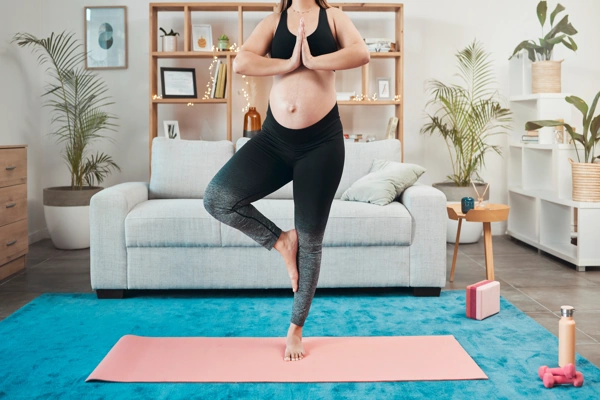Yoga can be an invaluable tool to improve both mental and physical wellbeing during pregancy, particularly for women who often experience anxiety or mood swings during this time.
Yoga can help reduce stress, strengthen your bond with your baby, and prepare you for labor and delivery. Furthermore, it increases GABA levels – which help regulate moods and reduce the effects of stress.

What are the Benefits of Yoga During pregnancy?
Improved Sleep is one of the benefits of yoga during pregnancy
Yoga can help you get a good night’s sleep. It helps you wind down after a stressful day, improves breath awareness and mindfulness, and increases physical activity levels – all of which may contribute to improved sleep quality.
Yoga not only helps you fall asleep faster, but it can also wake you up feeling refreshed. This is especially beneficial for pregnant women as the extra weight and bodily changes that occur during pregnancy can make it difficult to get adequate rest at night.
Research has demonstrated that yoga can reduce stress and promote better sleep during pregnancy, making it an excellent way to prepare for the birth of your baby. Some studies even show that practicing yoga during pregnancy improves one’s mood and boosts positivity about the experience.
A study published in the Journal of Obstetrics and Gynecology Research by Hayase and Shimada demonstrated that a prenatal yoga program could improve sleep for pregnant women. This included specific poses as well as breathing techniques, relaxation techniques and meditation.
Researchers found that yoga practitioners experienced better sleep than their non-yoga counterparts, as measured by the Pittsburgh Sleep Quality Index (PSQI). Indeed, their number of nightly awakenings decreased significantly when compared to the control group’s.
It is essential to remember that sleep disturbances can significantly reduce quality of life for older adults, as well as cause other health issues like accidents and falls. The results of this study are encouraging, showing yoga to be a safe and effective way to promote better sleep patterns and overall well-being among this age group.
A study published in the same journal found that practicing yoga twice a week for 12 weeks improved sleep quality and efficiency for men and women aged 60 or older with insomnia. The results demonstrated that yoga enhances sleep by relieving stress, anxiety, and depression.
Yoga during pregnancy offers even greater physical and mental advantages. As with many other healthy lifestyle habits, it’s best to consult your doctor if you are having difficulty sleeping.
Reduced Stress is a benefit of yoga during pregancy
Pregnancy can be an extremely stressful time for many women. The hormonal changes and physical discomfort that come with it can make it difficult to relax, leading to health issues such as depression or anxiety.
Yoga can be a great way to reduce stress and enhance mental wellbeing during pregnancy, according to Jessica Mossabeb’s book “Pregnancy: A Mindful Journey.” It teaches women how to connect with their thoughts and use breathing exercises as ways of de-stressing the mind, according to Jessica.
Studies have demonstrated that practicing yoga during pregnancy helps reduce stress and anxiety for expecting mothers-to-be, with some even reporting improved sleep.
Yoga can be a safe and low-impact activity for most pregnant women as long as they take proper precautions, like notifying their instructor if you’re expecting. Doing this helps avoid serious injuries such as sprains or strains in the lower back and legs which could prove fatal if not addressed early enough.
Research has also indicated that doing yoga while pregnant can help alleviate pain, such as pelvic girdle discomfort and varicose veins. Furthermore, it increases your range of motion while strengthening muscles essential for labor and delivery.
A study published in Complementary Therapies in Clinical Practice revealed that pregnant women who practiced yoga experienced less stress and better sleep than those who didn’t. The investigation demonstrated that yoga reduced levels of cortisol and epinephrine, two chemicals linked to stress.
Certain yoga poses can put undue strain or pressure on the abdomen, so it’s essential to adjust them as necessary. For instance, you could swap out downward dog with another pose that doesn’t involve your belly or head.
Yoga comes in many forms, but most of them emphasize breathing, stretching and relaxation. Prenatal yoga is especially beneficial for pregnant women since it addresses the physical changes occurring within your body during this time. Furthermore, prenatal yoga offers a chance to connect with other women facing similar struggles.
a Strong Bond With Your Baby is a benefit of yoga during pregancy
Yoga can help deepen the connection between you and your baby during pregnancy. It reminds you that you are intimately tied to this little being, and that they need a safe haven within you as they develop within the womb.
Making time to do yoga in a class led by an experienced teacher can help you focus on the positive aspects of your pregnancy. Not only does it keep you calm and focused, but the social connection that yoga brings also provides additional support and less isolation.
Additionally, prenatal yoga can reduce stress hormones and make you and your baby happier and healthier. A study revealed that women who practiced yoga experienced a 14% reduction in their stress levels.
Yoga can help reduce the risk of having a baby with health complications, as it increases blood flow to your baby so more oxygen-rich blood can get to them.
Your baby can begin practicing basic yoga poses as early as six weeks old, but it’s best to wait until they have complete head and neck control. Once they do, try out poses like Happy Baby Pose or Twister with them!
Are you worried that your baby might wake up during the night? Yoga can help alleviate their sleeplessness by encouraging relaxation and improving digestion. It may even relieve gas pains – another common source of nighttime difficulties.
Pregnant women can benefit from yoga’s gentle stretches and movements to increase their own body strength and flexibility, which will be beneficial during delivery and in the postpartum period. This is especially helpful if they’re recovering from an uncomfortable birth experience or dealing with pelvic floor issues.
Start with a gentle yoga style that emphasizes relaxation and breathing techniques. Be sure to consult your doctor before beginning any new exercise regimen, and take your time until you feel comfortable with the process.
Yoga during pregnancy offers numerous advantages, such as stress reduction, improved sleep quality and a closer bond with your baby. Furthermore, it’s an invaluable chance for moms-to-be to connect and support one another through this similar experience.
Better Preparation for Labor is a benefit of yoga during pregnancy
Yoga during pregnancy can be an incredibly helpful tool in prepping your body for labor. Not only does it increase self-confidence and make labor more comfortable, but it can also reduce pain and discomfort while providing relaxation when needed most. There’s no doubt about it: yoga helps prepare your body to make the most of this magical time!
Yoga can be especially helpful to women with high-risk pregnancies, as research has demonstrated that it reduces the likelihood of pregnancy complications and childbirth outcomes such as intrauterine growth restriction, premature birth and low Apgar scores. Furthermore, yoga helps you feel more in control of your labor experience and may reduce the need for pain medications during delivery.
Research has also discovered that yoga can significantly reduce a woman’s risk for postpartum depression. This is likely because practicing yoga during pregnancy helps you reconnect with yourself and strengthens the bond you share with your baby.
Breathing techniques taught in prenatal yoga classes can help you remain calm during labor and increase oxytocin, making you more sensitive to contractions. Ujjayi breathing, a specific type of yoga breathing, is especially beneficial for calming emotions and focusing on the present moment.
Another advantage of practicing yoga during pregnancy is that it helps strengthen the pelvic floor, which may prevent issues with this during labor and delivery. Furthermore, yoga has been known to alleviate lower back pain – an often-experienced symptom associated with pregnancy.
Exercising basic poses such as cat/cow pose and balancing table pose can help ease tightness in the hips and back that often comes with pregnancy. Furthermore, these poses stretch the spine and release tension in the lower back, making it easier to achieve a natural position for childbirth.
Additionally, it’s beneficial to incorporate some relaxation techniques like guided meditation or yoga nidra into your prenatal yoga class routine. These are typically included and can be done while sitting comfortably for 20-30 minutes.
Which Yoga Poses are Recommended During pregnancy?
There are several poses that are recommended by expert instructors and yogis to be more beneficial during pregnancy. These include the following:
- Child Pose
- Cat-Cow Pose
- Cobra Pose
- Downward Facing Dog Pose
- Warrior II Pose
- Triangle Pose
- Pigeon Pose
- Butterfly Pose
- Squat Pose
For a more in-depth discussion about specific yoga poses during pregnancy check out our article The Best Yoga Poses for an Enlightned Pregnancy.
conclusion
Prior to beginning any exercise regimen, it’s wise to consult your doctor or midwife first. Also, talk to your yoga teacher about what is safe and suitable for you. There are definitely benefits of yoga during pregnancy, but while many women can continue practicing yoga during pregnancy, it is best to avoid fast-paced classes or more challenging poses.
Is yoga safe during pregnancy?
Yes, yoga is generally safe during pregnancy, as long as you practice with caution and listen to your body. It is important to avoid deep twists, inversions, and backbends, and to talk to your doctor if you have any medical conditions or concerns.
When is the best time to start practicing yoga during pregnancy?
It is best to start practicing yoga during pregnancy in your first trimester, or as soon as you find out you are pregnant. This will help you establish a routine and prepare your body for the physical and emotional changes of pregnancy.
What are the benefits of practicing yoga during pregnancy?
Practicing yoga during pregnancy can help relieve stress and tension, improve sleep, increase flexibility and strength, and prepare the body for labor and delivery. It can also help with common pregnancy discomforts such as back pain and swelling, and promote overall physical and emotional well-being.
How often should I practice yoga during pregnancy?
It is recommended to practice yoga during pregnancy at least 2-3 times per week, or as often as you feel comfortable and safe.






